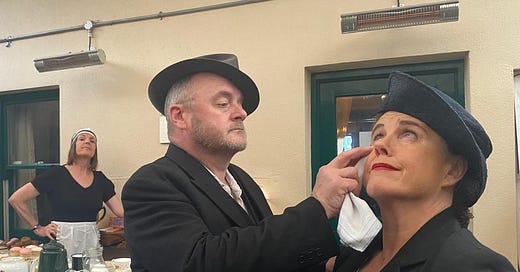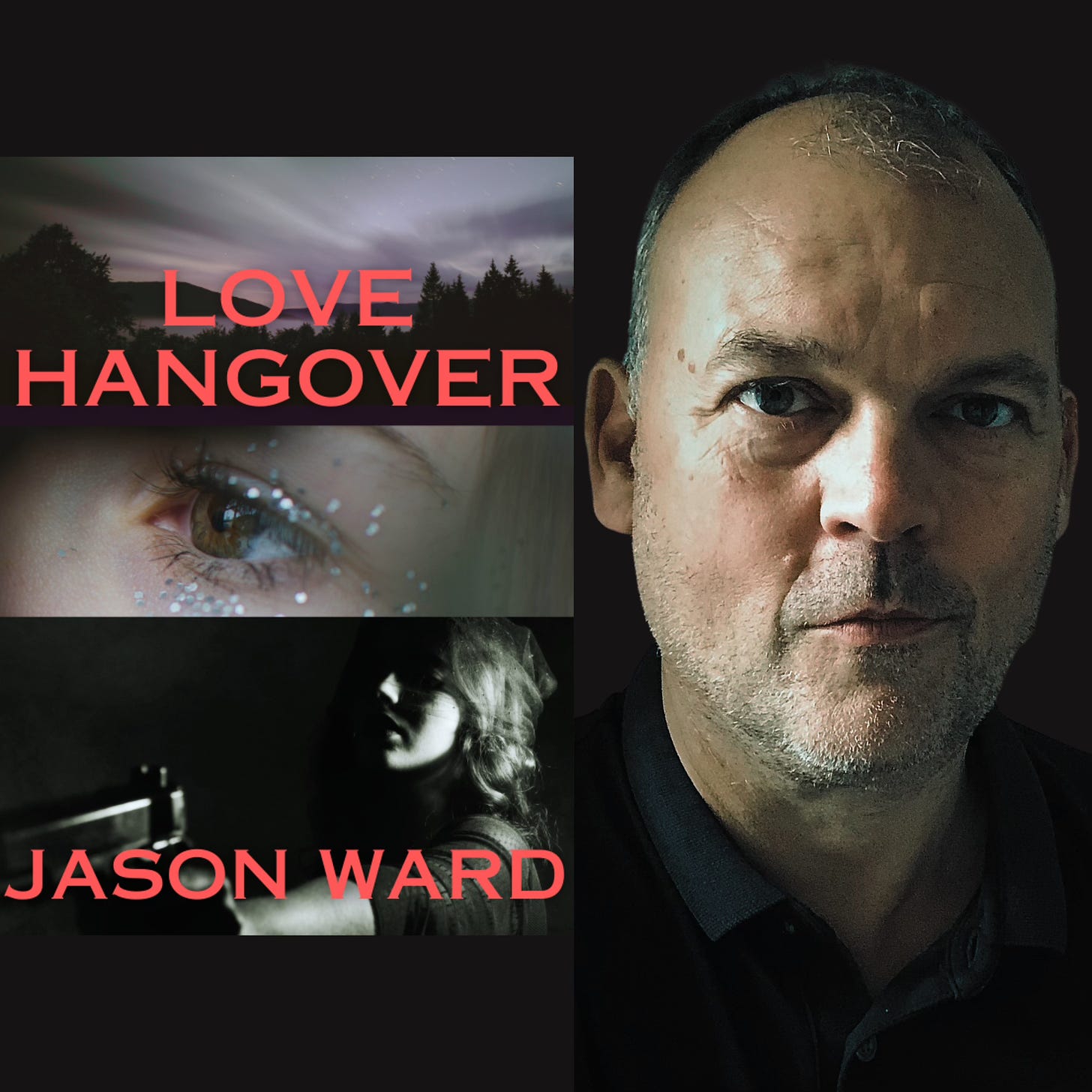REVIEW: Still Life by Noel Coward at The Tap Tavern, Kinsale.
Welsh company, Lighthouse Theatre, bring the play that became Brief Encounter to the back room of a pub as part of Culture Night 2024
Thank you for taking the time to read The JasonWard Creative Substack. This is where you will find reviews, new fiction, interviews, articles, podcasts and playlists on all aspects of creativity and the creative world. If you would like access to the full archive plus exclusive writing then please consider taking out a paid subscription. You can also support my writing by liking, sharing and commenting, all of which creates magic in terms of getting my posts seen. Either way thank you for your time and enjoy reading.
Culture Night 2024 featured thousands of events up and down the country. According to some estimates a quarter of the population or 1.7million people attended free arts and culture events on September 20th.
Around 30 of those audience members were in the back room of Kinsale’s glorious Tap Tavern. There were locals, Americans, Brits and at least one Argentinian all of whom were transported to Milford Junction railway station in England in 1947 by Lighthouse Theatre’s production of Still Life - the play that became the movie Brief Encounter.
Still Life was written by Noel Coward as part of a series of one act plays to be performed under the umbrella title “Tonight at 8:30pm.” The original London production in 1936 featured Coward himself alongside his oldest friend Gertrude Lawrence and was well received by critics, going on to play a season in New York as well.
This version adapted by Lighthouse’s Adrian Metcalfe for a three-person cast follows the same five scene structure and contrasting love stories of the original. We have the concealed and clandestine extra-marital affair between Alec and Laura which, if revealed, would destroy them both socially, professionally and emotionally. This is counterpointed by the bawdy, open and humorous back and forth between Ticket Collector Albert and Station Buffet Manager, Myrtle as they bundle their way to bed.
The production was presented in the Tavern’s semi-covered smoking area which has a stone floor and an old school Telefon box that both help to place the piece. The breeze that wafted through the space, the seagulls crying above, and the occasional bursts of traffic outside all combined with bells and steam train sound effects to enhance the atmosphere. And whether intentional or not, the fact that we were sat on wooden seats and benches properly placed us in a British Railways station waiting room in a time before they were all converted into branded coffee shops and fitted with fruit machines.
Back in the day, after a late night out in London, I could get the train home as far as Woking where they had a lovely heated waiting room and solid wooden benches that perfectly fitted my teenage sleeping self. At around 5:00am the station master would bang on the door and shout “first train down” and I would stumble into the cloth seated carriage for the 15 minute journey to Ash Vale. I could be in my bed by 6:00am and, if I was quiet enough, nobody would know that I had been out all night.
Still Life opens with great energy (and biscuits for the crowd). Myrtle (Sonia Beck) is training Beryl (Carla Goodman who also directs) on how things should be done in the station refreshment room. There is comedy and a warmth that welcomes us in much the same way we imagine Myrtle would have welcomed her customers to the refreshment room. There was a touch of Mrs Slocombe in Beck’s playing of Myrtle with her pretence of outward respectability which we see fall apart once Albert the ticket collector (Metcalfe) enters the refreshment room. He shamelessly flirts with single entendres and bottom slapping. There is no sense that Coward is mocking these characters for their less refined manners. In fact, they serve as a clear counterpoint to the stuffiness and restrictions of the principal couple who we meet later.
Like every good opening scene, this one immediately places the audience in a place and time. The reason we are there soon becomes apparent when a woman (also Beck) enters seeking help with some grit in her eye. Ms Beck transforms from bawdy serving wench Myrtle to classy, elegant and refined (and/or repressed) middle class English woman Laura. The change in physicality, tone and energy is incredible requiring no suspension of disbelief or moment of adjustment.
Laura is assisted by Alec (Metcalfe)who happens to be a doctor. In this role Metcalfe has thrown off the earthiness of the Albert and pitches his voice a little higher, slows down his speech and hits every consonant as he inhabits the physician’s character. The pair soon draw themselves into a bubble that excludes the world and is only punctured by the arrival and departure of trains.
From a random meeting at the station, Alec and Laura’s mutual attraction sees them graduate to an afternoon at the movies, which was scandalous behaviour for married people in 1936. However, this play is about more than a fantasy of attraction.
Still Life is a play about the power of physical attraction and passion. And this is not the unrequited type represented by a shy downward stare behind a fan or middle-class Regency woman looking mournfully out of the window of a stately home. This is two grownups, married with children, who fancy the pants off each other and go to someone else’s flat for Thursday afternoon delight - all in an age before female contraception or safe, legal abortion. The risks were huge, but the desire was bigger.
The challenge for the actors is that the audience only sees them in a public place. In 1947 people just didn’t snog in the railway refreshment room so all that repression, that knowledge of what has happened offstage has to be carefully communicated. The audience must understand but other passengers must not. Metcalfe and Beck take us to the edge of glory without even a touch, let alone a kiss. Their performances in these roles are wound tight, the audience willing them to make the impossible choices that will allow us our happy ending.
In the final scene the pair are spending their last few minutes in the refreshment room together before Alec departs for Johannesburg. There is still hope, perhaps. But the dam of emotion that Laura and Alec have broken must be quickly blocked again. No trace can be visible. We are left frustrated, angry and sad.
It is this final scene that elevates Still Life / Brief Encounter into the pantheon of classics. However, if the other 35 minutes are not directed and acted well enough then the ending risks limply running out of petrol at the side of the road.
In this production, Lighthouse Theatre have filled the dramatic tank. We know Alec and Laura; we know what they have been through, and we feel that they belong together. Metcalfe’s adaptation has had to remove scenes that show us Laura’s tedious home life which leaves the company less material to play with. This does not matter because the company have the talent to show us their characters’ tension, the passion and the frustration. That they do all of this in 40 minutes is a testament to the strength of Metcalfe’s adaptation, Goodman’s direction and the cast’s ability to weave a spell.
Still Life was presented as part of Culture Night 2024
Find out more about Lighthouse Theatre here: https://www.lighthouse-theatre.co.uk
My collection of short Stories, Love Hangover, is available to download for only €2.49. The stories take you from Studio 54 hedonism to Cold War paranoia and feature a cast of characters including a female assassin, an old school London gangster and a woman who hates raisins. The writing has been described as ‘pacy and exciting’





